DIY Pouf Ottoman Cube
Pouf ottomans are one of the nigh versatile small-furniture pieces around. They are a stool, a footrest, a table. They are soft and comfortable, yet structured and on-trend. They amp up the friendliness of a space immediately, and we just beloved them.
 View in gallery
View in gallery  View in gallery
View in gallery This tutorial will demonstrate how to make your very own pouf ottoman cube in function of an afternoon, including tips and tricks to maneuvering the parts that seem, at first glance, tricky. Soon you'll be enjoying your very own pouf ottoman cube!
 View in gallery
View in gallery Ready to begin? Let's get.
 View in gallery
View in gallery DIY Level: Beginner to intermediate sewing skills
 View in gallery
View in gallery Materials Needed:
- 1-one/2 yds durable (e.1000., upholstery or outdoor) cloth, cutting into two (2) 19"x19" squares and four (4) 19"x15" rectangles
- 6 yds pipe (brief clarification on how to make your own included in this tutorial)
- Ane (one) zipper at least 15" long
- One (ane) purse of 100L polystyrene assurance (or 3-iv cubic feet)
- Upholstery thread
 View in gallery
View in gallery If you haven't already, begin by cutting out your heavy-duty fabric. I strongly recommend upholstery or outdoor fabric due to its durability and hardiness. This tutorial shows an upholstery in a archetype herringbone weave. Call back, you'll demand two xix"x19" squares (these will be the top and bottom of your pouf) and four nineteen"x15" rectangles (these volition be the sides, and so brand sure they align the aforementioned style if your fabric has a design).
 View in gallery
View in gallery You can purchase pre-sewn piping, ready to go, or you can speedily make your own. Although this is not an in-depth description of how to make your own, merely put, you may cut strips of the fabric of your choice about 3" wide; sew several together to make a long (about 6 yards) strip. Lay cording (purchased at a arts and crafts/fabric store or through a local upholsterer) downwards the center of the Wrong side of your piping fabric, then fold so the right sides are showing and sew tightly together using your sewing machine's zipper foot.
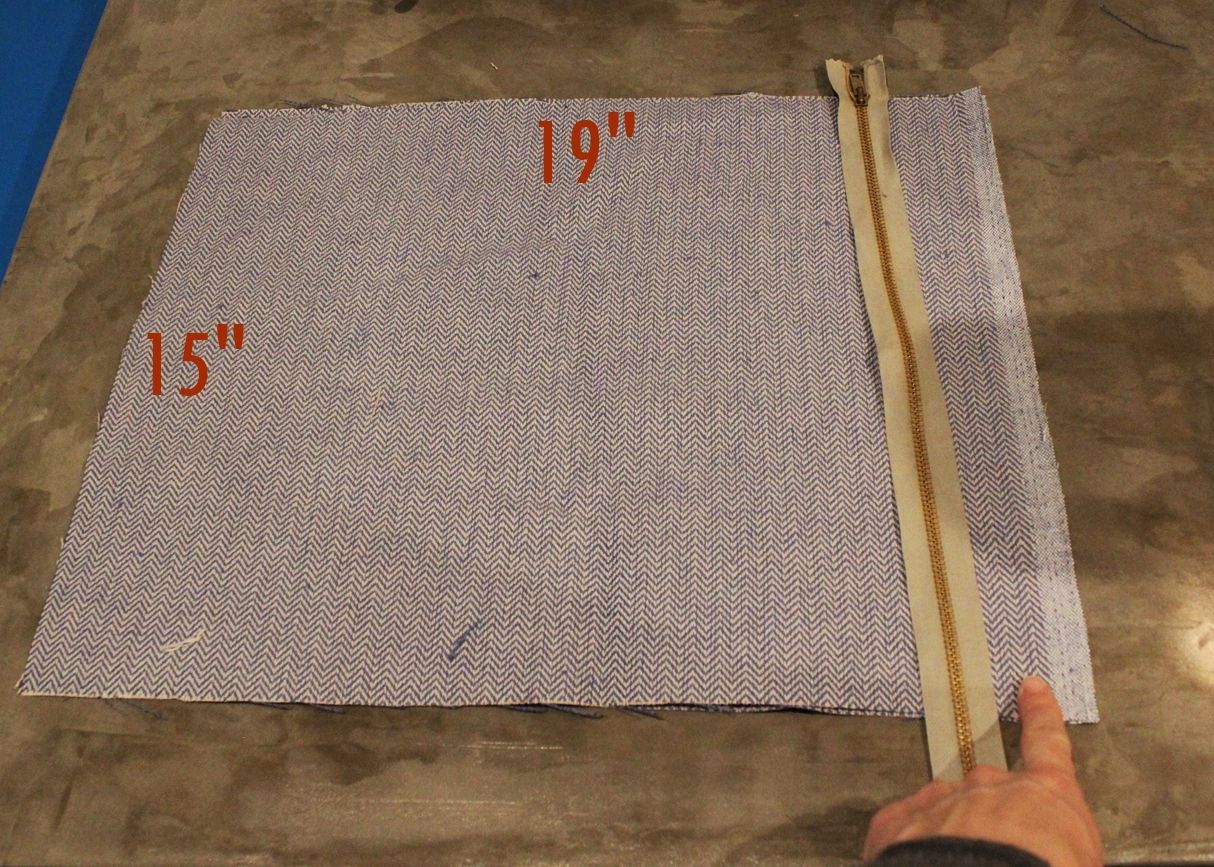 View in gallery
View in gallery Accept two of your side pieces (nineteen"x15") and lay them on acme of each other, Correct sides in.
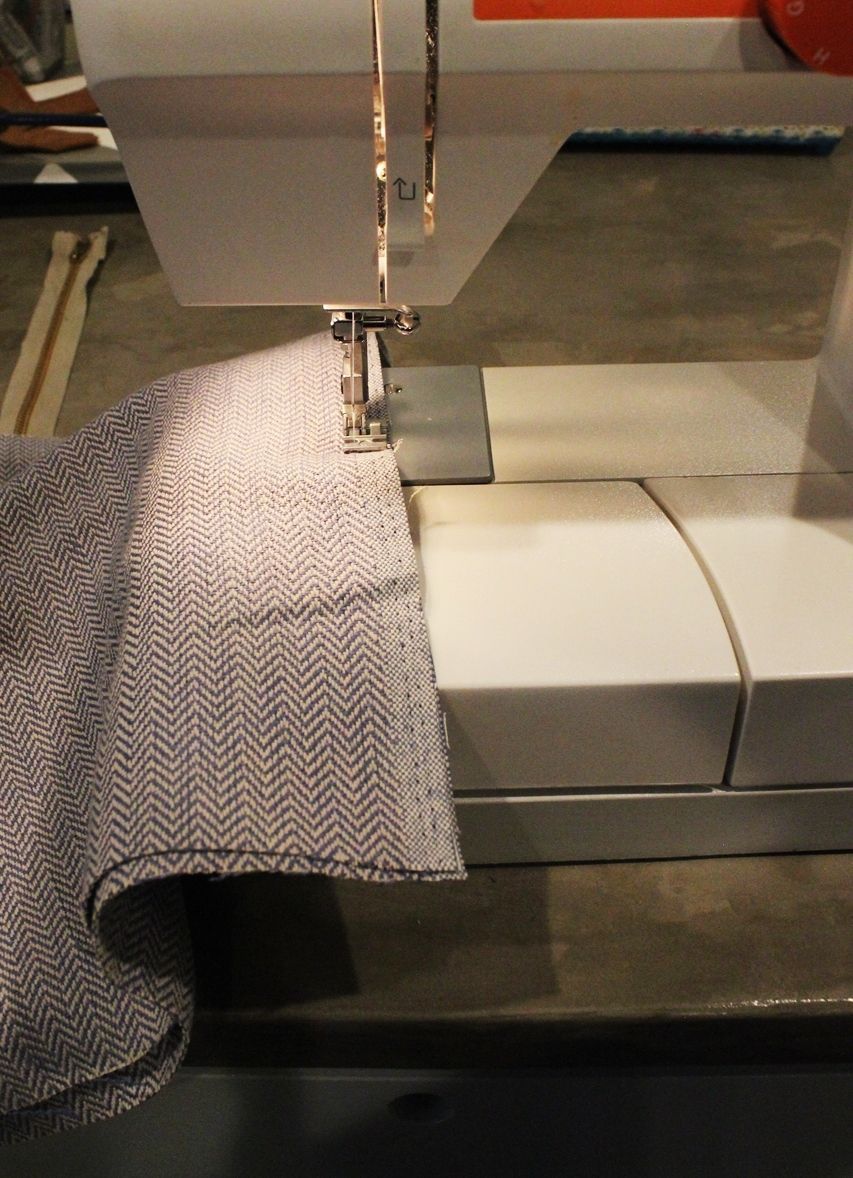 View in gallery
View in gallery Employ your sewing car's largest stitch (chosen a baste stitch) to sew one piece'southward short (15") side to the other slice's curt side.
 View in gallery
View in gallery Printing the basted seam open with an iron. (Sorry, I forgot to mention you'll want an iron.) Even if you detest ironing, don't skip this step – it's important for your zipper'due south success.
 View in gallery
View in gallery With the Right sides facing downward, identify your zipper face-down so the zipper itself lies straight on the seam. Your zipper pull should simply exist about 1/ii″ down from the meridian of the seam-border.
 View in gallery
View in gallery Pin attachment into place. Notation: This tutorial uses a heavy duty metal zipper, and so I unzipped function of it for easier sewing. It'south easier, and meliorate, if you leave your zipper closed during sewing.
 View in gallery
View in gallery Apply your attachment human foot to carefully sew the zipper into place. (This is why y'all wanted a pressed-open seam; so your zipper would attach beautifully.)
 View in gallery
View in gallery When your zipper is fastened, utilize a ripper to rip the baste seam open. Tada! A working zipper. Piece of cake, correct?
 View in gallery
View in gallery Grab your other two side pieces (xix"x15") and, placing right sides together, sew the brusk sides together then to the two zipper side pieces. You should take a tube of sorts, with all the short (15") sides sewn together.
 View in gallery
View in gallery Lay your tube downwardly, RIGHT side up, then lay your pipage on top of the border with the raw edges together and aligned, then grab one of your 19"x19" squares and stack, WRONG side up, on top of the piping. Make sure raw edges are all aligned for all three components (side-tube, piping, and square), and make sure the corners of your nineteen" square lines upward with the corner seams of the tube. Get out yourself nigh 4" of pipage, just dangling, before starting to pin the piping. Pin into place, all the fashion around (until you go to the end of the piping; merely leave the final iv" for now – but DON'T cut your pipe yet, just allow the extra 3 yards dangle for now). If you lot find you need more than or less length on a item side, you can adjust a side seam on your tube, if necessary.
 View in gallery
View in gallery Corners can be tricky, but hither'southward what y'all practice: curve your pipe around the right bending of your xix" square (recollect of the curves on a race track – they're not going to be right angles, only they'll be close curves), and then accept your tube seam split ever then slightly (similar 1/2″ in) to follow the curve of the piping. Pivot into place, then stitch together. Stitch the three pieces together (tube, piping, and 19" square) all the way effectually the edges, minus about four" from the first and 4" from the end of the piping.
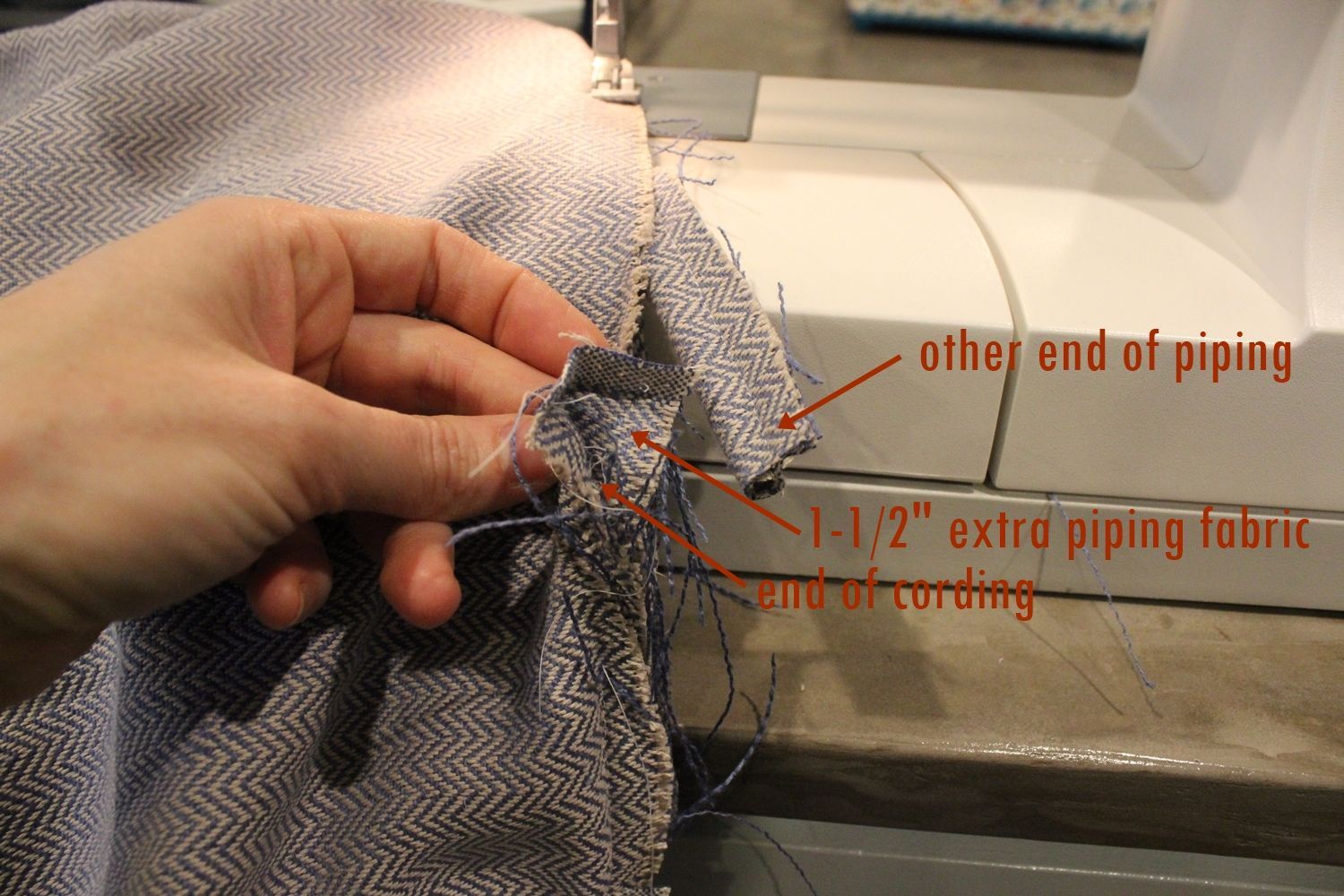 View in gallery
View in gallery Remember how you left the piping start and end dangling about four" out? We're going to cease up the pipe before you consummate the seam. Pull 1 cease of your piping textile downwardly so well-nigh one-1/2" of cording is exposed. Cut off Only the cording here; leave the piping cloth. Pull the other end of your pipage past the pipage cloth's edge, upwards to the cut end of the cording itself, and cut the pipage and then that it will just exactly bear on the cutting end of the cording.
 View in gallery
View in gallery At present focus back on the cutting finish of the cording, with excess pipage fabric. Fold downward the top i/2″ of the extra pipage fabric. This will exist the exposed edge, visible on your pouf ottoman.
 View in gallery
View in gallery Insert the other stop of piping into the actress pipage fabric (that extra piping fabric will exist kind of like a hard taco shell for the other pipage terminate). The two ends of cording should impact – not overlap or gap too much.
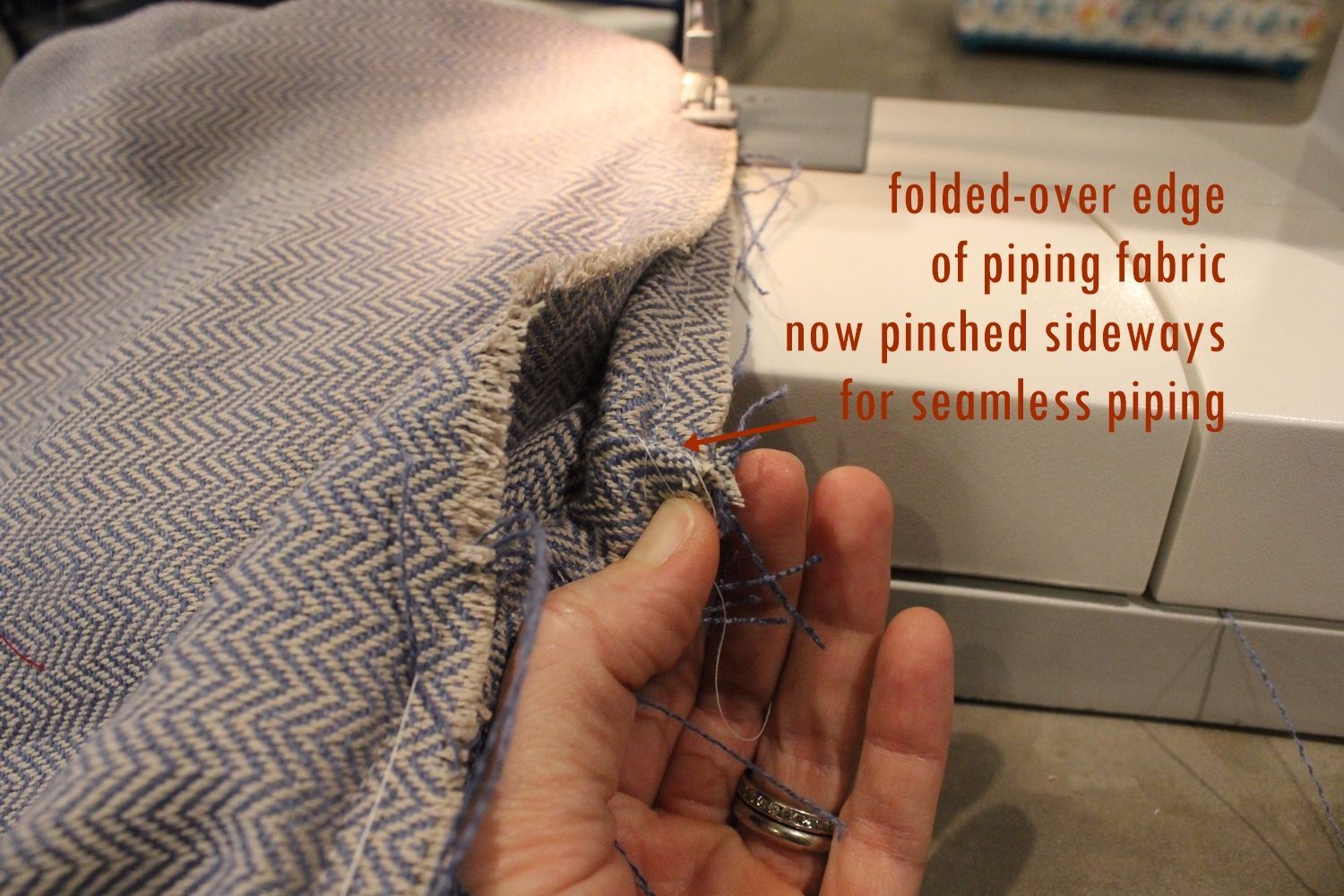 View in gallery
View in gallery Compression the raw sides of the extra pipage cloth together to sandwich the other pipage terminate inside. Pin the at present-seamless piping ends into place with your tube and 19" square piece.
 View in gallery
View in gallery Sew together up the raw edges equally though it'south just a regular ol' piece of piping under there, not the stressful bane of your sewing existence. (Just kidding – I hope it wasn't that terrible.)
 View in gallery
View in gallery Flip your tube right-side-out and then you tin can run into your pipage. Isn't it cute? Brand sure the piping is nice and taut all the way effectually before moving on; if it's loose or unattached somewhere, such every bit a corner, simply flip it back wrong-side-out and re-sew the seams.
 View in gallery
View in gallery When everything looks skilful, run a zigzag stitch (or use your serger) all the style around the raw edges of your tube/pipage/19" foursquare seams, particularly if your fabric is every bit fray-ish as my beautiful herringbone fabric is.
 View in gallery
View in gallery Repeat piping attachment steps for the other side of your tube, using the rest of your piping and the other 19"x19" square slice. Exist sure to continue the right sides of the tube and foursquare piece facing each other, and the piping sandwiched in betwixt. Also, have care to unzip your attachment at least a little bit about halfway through sewing this side, so you can access the zipper pull and open up it to flip your fabric right-side-out when it's all the manner sewn up. Turn it right-side-out.
 View in gallery
View in gallery Snip any errant frayed threads close to your seams, taking care to avoid snipping your cloth or piping. That would be sorry.
 View in gallery
View in gallery Open up up your bag of polystyrene balls carefully – these things fly everywhere, and "static" is their centre name. Or, at least, information technology should be.
 View in gallery
View in gallery I used a wide-mouth funnel to pour the balls into the pouf. Shake your pouf every and so often to settle the balls; you can fit more into your pouf ottoman than you might first think. I only had a fiddling fleck left over from my 100-liter bag of polystyrene balls. (You can do what you want with any extra balls you have; I simply added mine to this DIY kids bean purse chair, which benefited from the supplement.)
 View in gallery
View in gallery Plump information technology out the way you like information technology. The attachment probably won't get used a lot, but information technology's nice to have so that you can refill polystyrene balls as needed over time.
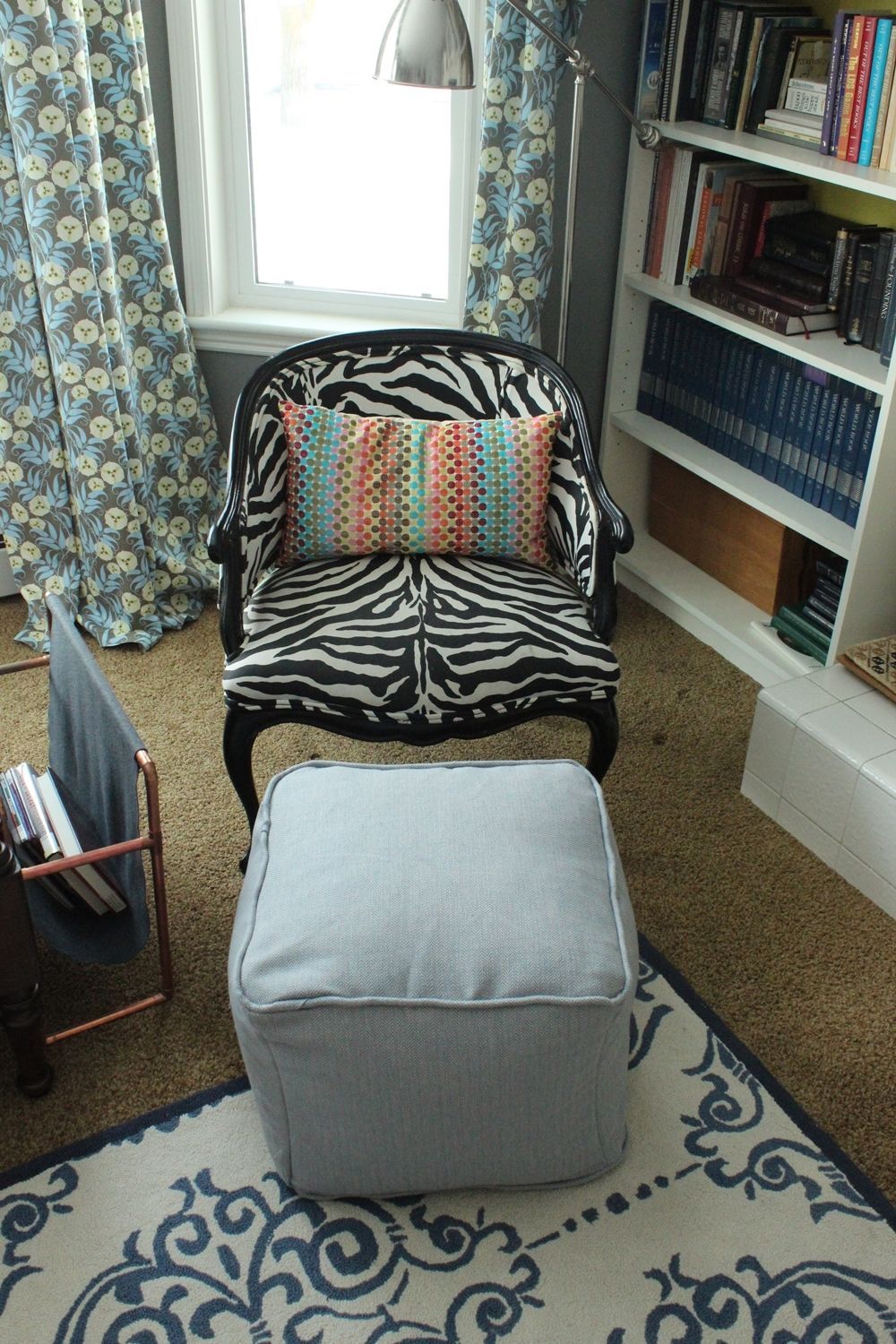 View in gallery
View in gallery Congratulations! Y'all did it! You fabricated your very own DIY pouf ottoman cube.
 View in gallery
View in gallery This DIY pouf ottoman is a wonderful addition to the form and part of your infinite, whether it'south a bedroom or living room or home role.
 View in gallery
View in gallery Of class, ane of the great things about DIY projects is their customization – you lot tin make this whatsoever size you desire, actually. This size works keen for our infinite. My family especially loves how it comfortably fits pocket-sized bodies…
 View in gallery
View in gallery …as well every bit larger ones. Information technology really is comfortable on all counts!
 View in gallery
View in gallery I hope y'all thoroughly savor your pouf ottoman and go tons of daily utilize out of information technology.
Source: https://www.homedit.com/pouf-ottoman/
0 Response to "DIY Pouf Ottoman Cube"
Post a Comment